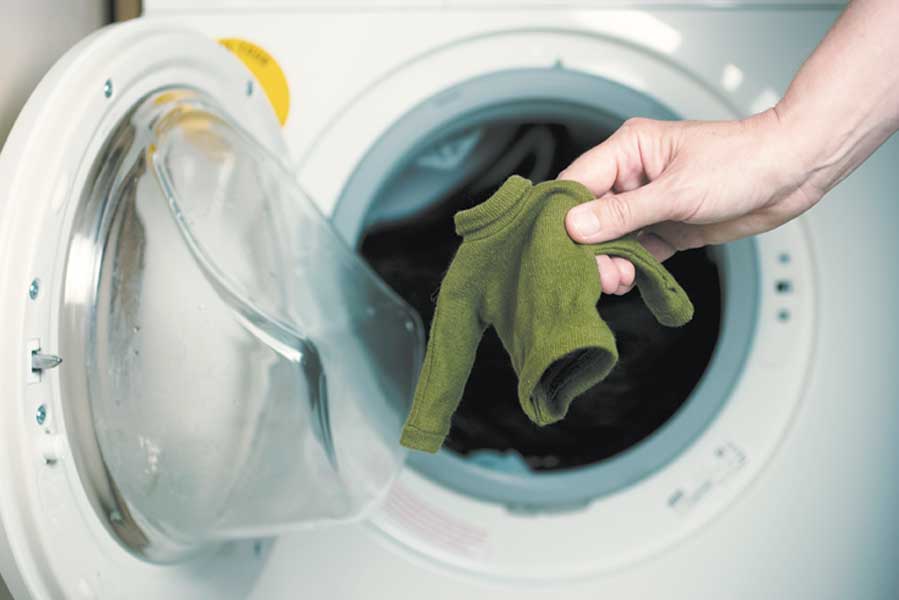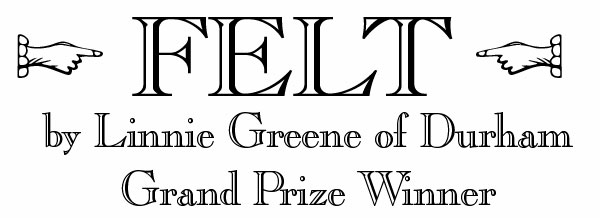Once again, we are floored by the superb writing of our Carolina women. The magazine received more submissions to the annual writing contest this year than ever before, and the competition was fierce. Every entry's feeling and boldness were touching in unique ways - we giggled, cringed, fumed, fretted and maybe even shed a tear or two.
Then Carolina Woman's editors felt each of those emotions again, this time from trying to choose the best. After heated days and restless nights, we've finally selected the winners and we are so very proud of them.
In her book "Bird by Bird," Anne Lamott wrote, "One of the gifts of being a writer is that it gives you an excuse to do things, to go places and explore. Another is that writing motivates you to look closely at life, at life as it lurches by and tramps around." This is exactly what each of our winners does, taking us to near and faraway places, from North Carolina around the country and across the world with immaculate specificity and vivid language.
We present to you now a diverse selection of poetry and prose; though similar in their uses of striking, unconventional detail to portray universal emotions and struggles. Each writer takes broad ideas, such as love, loss and alienation, and makes them intensely personal. By seemingly banal means, these writers invite their readers into individual worlds of anguish and triumph. They illuminate what it means to be human on a level that speaks to all.
Grand Prize
Linnie Greene from Durham for her story "Felt"
Prize: Pet & People Portraits by Lynne Srba - $450 Value
First Prize
Caroline Mann from Raleigh for her poem "Market Square"
Prize: One hour of computer repair or tune-up from Tech Wizards - $129 Value
Second Prize
Katherine Avanesyan from Chapel Hill for her poem "Milk"
Prize: Custom-made floral arrangement from Brooke & Birdie Interior Design - $100 Value
Third Prize
Kelsey King from Gastonia for her story "In Waiting"
Prize: 1-year Membership in North Carolina Writers' Network - $75 Value
Honorable Mentions
Charlotte Fryar from Chapel Hill for her poem "Crazy Aunt Sarah"
Alice Osborn from Raleigh for her poem "Ode to Hamburger Helper"
Sarah Ellis from Chapel Hill for her poem "Communion"
Terri Kirby Erickson from Lewisville for her poem "Searching for Scallop Shells"
Emily Palmer from Durham for her story "A View From Paris"
Janice A. Farringer from Chapel Hill for her poem "Good Night"
Genevieve Fitzgerald from Raleigh for her poem "Arctic Bonsai"
Prize: Carolina Woman tote bag - invaluable
Ruth's in the kitchen when he knocks on the door. It's already open, just the screen between her and the fall air, but he raps a few times anyway because it is not his house. The funeral has been over for several hours now, and night is hovering over the last few minutes of a sunset.
"Come on in, Banks," she says and opens the door, swatting away two beagles that are braying by her feet.
He follows her, his father's last wife, into the kitchen. She looks tired. There is a television on, playing Veggie Tales, and two toe-headed boys are watching it. They are sitting close enough that the screen casts blue onto their faces. On top of the television, there is a gold-painted cross. Throughout the house, there are crosses - straw ones, metal ones, hanging ones, standing ones.
Ruth notices him looking at a shelf next to the microwave. "Do you like that one? Your Dad gave me that. He brought it home from the mission trip in Ghana. The orphans make them there." She pauses and looks off, and he can see the bags underneath her eyes. Banks thinks she's imagining his father as a saint. It's hard for him to match his memories to hers. "You can have it if you like."
She's all earnestness, and it was always a wonder to him that his father ended up with someone who wore long denim dresses and went to church. She has a brown bob that's only just beginning to gray, and a wire-rimmed pair of glasses that sit plainly on her face. It is strange to him that his father - Banks senior - could have loved someone so unlike his mother, someone whose devotion to God often manifested in the Paula Deen casseroles she baked for his birthday each year, and the trips they took to South America to help the poor. There is nothing not to love about her, but that's all there is. There's nothing more. His mother smells like patchouli and drinks expensive wine and hasn't been to church in ages. Banks never goes at all.
 The earliest and realest memories Banks has are of his drives to school. His father used to drive an old white Jeep whose paint left rusty prints where it had faded. Banks remembers waking up on cold fall mornings and heaving himself up into a seat that seemed too large, remembers how his father would leave the car idling in the driveway so it would be warm for the trip. Banks remembers learning what "ass" meant, and how he'd accidentally told his mother, who got so angry, and how his father's deep voice would bellow a high, staccato laugh after the best jokes on sports radio.
The earliest and realest memories Banks has are of his drives to school. His father used to drive an old white Jeep whose paint left rusty prints where it had faded. Banks remembers waking up on cold fall mornings and heaving himself up into a seat that seemed too large, remembers how his father would leave the car idling in the driveway so it would be warm for the trip. Banks remembers learning what "ass" meant, and how he'd accidentally told his mother, who got so angry, and how his father's deep voice would bellow a high, staccato laugh after the best jokes on sports radio.
Ruth reaches behind him for the clay ornament with the sad-faced angel child on it and folds her hands around his. "Here," she says. "It'll remind you of him." She is the kind of person who says things like that, things that most people could never say so earnestly. She turns away and goes into the other room, and he hears the snap of the dryer's lid, the scrape of the lint screen.
His father died from melanoma, the kind he got over summers ministering to children who were not his own after he'd left Banks and his mother stateside. He'd met Ruth ten years later, when they both attended a conference - Banks senior for the buffet, Ruth for the spiritual enlightenment - and the twins had been born five years after that, too late for Banks to think of them as anything but distant kin. He hears them start to sing along in high-pitched chipmunk voices to the DVD in the other corner of the room. They are close enough to the television that he thinks he can see their breath fogging up the glass.
He stands there in the pale half-light of the kitchen, waiting for Ruth to fill his car with his father's sweatshirts and scarves and other useless things that he'll end up giving to Goodwill as soon as he leaves Minnesota.
Then, there is sobbing that he hears from the laundry room. Breathless hiccups. The twins turn their heads, and one of them gets off the couch and stares from across the room in his Batman pajamas.
"It's ok guys," Banks says after the silence has lasted too long. They eye him, gaping like two fawns. He lays the clay cross with the angel on it on the counter and walks towards his stepmother.
Ruth is standing over the dryer, the shoulders of a wool sweater in each hand. She holds it out in front of her, running her swollen eyes over every shrunken inch. It used to be saggy and large enough to cover his father's belly, and now it is felted and small, too small to fit over Banks' shoulders.
"I'm so sorry," Ruth says, looking down at the sweater. "I'm so sorry."
Neither of them knows what to do. Eventually he puts one hand on her shoulder and takes the sweater with the other. It's still warm, and the wool is dense and soft, springy and thick. He walks over to the twins.
"It's alright," he tells them.
The one closest to him stares with his gray eyes, then takes the sweater Banks is holding toward him and slides it over his head, over Batman's image on his T-shirt. It will only take a few months for him to grow into it, Banks thinks. In the supermarket, someone might ask the boy where he got the sweater, which is striped with garish bright turquoise and gold yarn, and he will say, "My Daddy." Banks will be wearing swim trunks in the ocean, and he will never think about the sweater except to wonder once whether his father had ever worn it at all.
First Place
Market Square
By Caroline Mann
What is there to say? Only
that ice-cream tastes better
from a wooden spoon,
the kind that is shaped like a peanut-
a sweet and smooth paddle
cupping the vanilla
softly on its own tongue
before offering it to yours.
It is this, and a girl
with red hair and green bows
squealing at the water’s rise and fall
through the holes in her bright peach sandals.
Later, her mother makes a tent
of the red towel,
curving it around the girl’s paleness
so that she might change inside.
But she leaps,
like a wet fish from her mother’s arms
to run back into the fountain-
a wild streak of white
against the crowded scene.
And her skin is the color of ice-cream
in the noonday sun.
“Annabelle!” her mother calls
“You come back here!”
But the girl runs on, wanting only to feel
the water splashing
between her naked legs.
Second Place
Milk
By Katherine Avanesyan
Spiral-capped jugs, glass and plastic,
pink for one percent, blue for two
and ice-cold behind the foggy doors,
momentary Siberia when I open them,
and hot, like Uzbekistan again
when shut—waiting with Katyusha
for the town’s only dairy cow, a road
where we lined up til’ three and sweat
into our socks, where Katya cried
And I recited Pushkin, where I cried
when she first said my name.
Now the cartons sit in rows,
sliding one behind the other
and we shop at Piggly Wiggly,
where the milk lines up for us.
![]()

